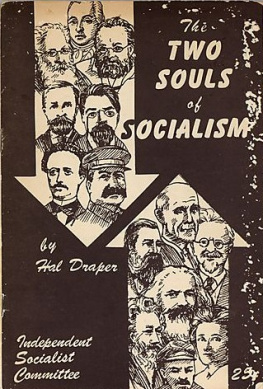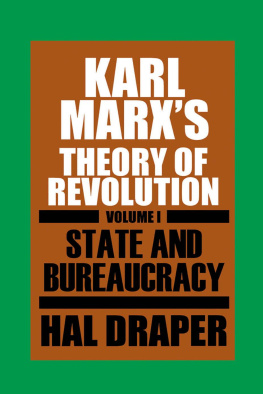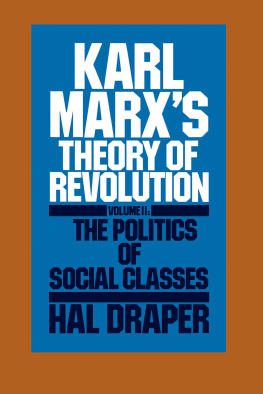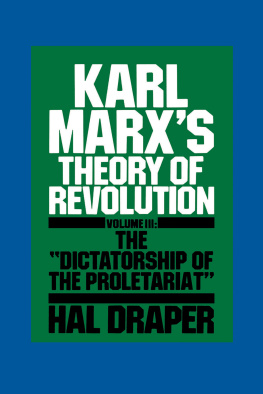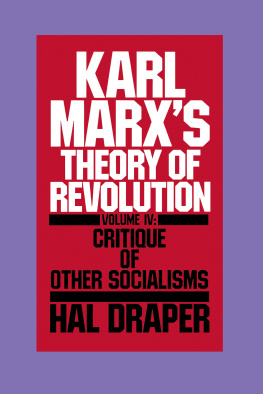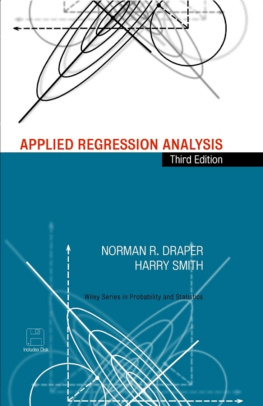Hal Draper - The Two Souls of Socialism
Here you can read online Hal Draper - The Two Souls of Socialism full text of the book (entire story) in english for free. Download pdf and epub, get meaning, cover and reviews about this ebook. year: 2017, publisher: Marxists Internet Archive, genre: Politics. Description of the work, (preface) as well as reviews are available. Best literature library LitArk.com created for fans of good reading and offers a wide selection of genres:
Romance novel
Science fiction
Adventure
Detective
Science
History
Home and family
Prose
Art
Politics
Computer
Non-fiction
Religion
Business
Children
Humor
Choose a favorite category and find really read worthwhile books. Enjoy immersion in the world of imagination, feel the emotions of the characters or learn something new for yourself, make an fascinating discovery.
- Book:The Two Souls of Socialism
- Author:
- Publisher:Marxists Internet Archive
- Genre:
- Year:2017
- Rating:3 / 5
- Favourites:Add to favourites
- Your mark:
- 60
- 1
- 2
- 3
- 4
- 5
The Two Souls of Socialism: summary, description and annotation
We offer to read an annotation, description, summary or preface (depends on what the author of the book "The Two Souls of Socialism" wrote himself). If you haven't found the necessary information about the book — write in the comments, we will try to find it.
The Two Souls of Socialism — read online for free the complete book (whole text) full work
Below is the text of the book, divided by pages. System saving the place of the last page read, allows you to conveniently read the book "The Two Souls of Socialism" online for free, without having to search again every time where you left off. Put a bookmark, and you can go to the page where you finished reading at any time.
Font size:
Interval:
Bookmark:
Hal Draper, The Two Souls of Socialism, New Politics 5, no.1, Winter 1966, pp.57-84.
Reprinted in numerous editions, both authorised and unauthorised. [1]
Downloaded from the Marxism Page many thanks to Rick Kuhn. Center for Socialist History (CSH), Berkeley; published here with kind permission of the copyright holders.
Marked up by Einde OCallaghan for the Marxists Internet Archive.
Converted to eBook format by Ben Taylor
This is a completely rewritten and expanded version of a study which originally appeared in the socialist student magazine Anvil (Winter 1960) and was subsequently reprinted two or three times elsewhere. The framework, the general content, and some passages remain, but I have taken advantage of this new edition to make a thorough revision of what was a hasty first draft.
The aim is not to give a history of socialist thought in a nutshell, but simply to illustrate a thesis the thesis being a historical interpretation of the meaning of socialism and of how socialism came to mean what it does today. To this end I have selected for discussion a few of the most important socialist currents up to the early 20th century, since the object of the inquiry is the wellsprings of the modern socialist movement. There are a number of tendencies which would have been difficult to treat briefly, and are therefore not discussed here at all, such as syndicalism, DeLeonism, Bolshevism, the IWW, the collectivist liberals, etc.; but I believe that their study leads to the same conclusions.
The chief difficulty in treating the subject briefly is the heavy encrustation of myth over the written history of socialism. At the end I have listed a very few works which are especially useful for some of the figures discussed here; for others the interested reader simply has to go back to the sources. There is no half-decent history of socialist thought extant today: and there probably will not be one until more socialist scholars do the kind of job that E.P. Thompson did for William Morris, whose image had been almost obliterated by the myths.
Speaking of William Morris, I re-read A Dream of John Ball, and came once again across the oft-quoted passage about Well, let us quote it again, as motto for the following pages: ... I pondered all these things, and how men fight and lose the battle, and the thing that they fought for comes about in spite of their defeat, and when it comes turns out not to be what they meant, and other men have to fight for what they meant under another name...
H.D.
1. The Two Souls of Socialism appeared in New Politics 5, no.1 (Winter 1966) pp.57-84, a pamphlet published by the International Socialists, Highland Park, Michigan, revised edition, fourth printing 1970 and was included in Socialism From Below by Hal Draper, essays selected, edited and with an introduction by E. Haberkern, Humanities Press, Atlantic Highlands 1992 pp.2-33. That edition is now out of print. The The Two Souls of Socialism was scanned and digitized into ASCII text and mounted on the Guelph Socialists Homepage (now defunct). The Guelph version was edited to eliminate some divergences from the Socialism From Below text to form the edition below. The paragraph in section 3. What Marx Did in {curly brackets} appeared in the 1966 pamphlet but not the Socialism From Below edition.
Socialisms crisis today is a crisis in the meaning of socialism. For the first time in the history of the world, very likely a majority of its people label themselves socialist in one sense or another; but there has never been a time when the label was less informative. The nearest thing to a common content of the various socialisms is a negative: anti-capitalism. On the positive side, the range of conflicting and incompatible ideas that call themselves socialist is wider than the spread of ideas within the bourgeois world.
Even anti-capitalism holds less and less as a common factor. In one part of the spectrum, a number of social democratic parties have virtually eliminated any specifically socialist demands from their programs, promising to maintain private enterprise wherever possible. The most prominent example is the German social-democracy. (As an idea, a philosophy, and a social movement, socialism in Germany is no longer represented by a political party, sums up D.A. Chalmers recent book The Social Democratic Party of Germany.) These parties have defined socialism out of existence, but the tendency which they have formalized is that of the entire reformist social democracy. In what sense are these parties still socialist?
In another part of the world picture, there are the Communist states, whose claim to being socialist is based on a negative: the abolition of the capitalist private-profit system, and the fact that the class which rules does not consist of private owners of property. On the positive side, however, the socio-economic system which has replaced capitalism there would not be recognizable to Karl Marx. The state owns the means of production but who owns the state? Certainly not the mass of workers, who are exploited, unfree, and alienated from all levers of social and political control. A new class rules, the bureaucratic bosses; it rules over a collectivist system a bureaucratic collectivism. Unless statification is mechanically equated with socialism, in what sense are these societies socialist?
These two self-styled socialisms are very different, but they have more in common than they think. The social democracy has typically dreamed of socializing capitalism from above. Its principle has always been that increased state intervention in society and economy is per se socialistic. It bears a fatal family resemblance to the Stalinist conception of imposing something called socialism from the top down, and of equating statification with socialism. Both have their roots in the ambiguous history of the socialist idea.
Back to the roots: the following pages propose to investigate the meaning of socialism historically, in a new way. There have always been different kinds of socialism, and they have customarily been divided into reformist or revolutionary, peaceful or violent, democratic or authoritarian, etc. These divisions exist, but the underlying division is something else. Throughout the history of socialist movements and ideas, the fundamental divide is between Socialism-from-Above and Socialism-from-Below.
What unites the many different forms of Socialism-from-Above is the conception that socialism (or a reasonable facsimile thereof) must be handed down to the grateful masses in one form or another, by a ruling elite which is not subject to their control in fact. The heart of Socialism-from-Below is its view that socialism can be realized only through the self-emancipation of activized masses in motion, reaching out for freedom with their own hands, mobilized from below in a struggle to take charge of their own destiny, as actors (not merely subjects) on the stage of history. The emancipation of the working classes must be conquered by the working classes themselves: this is the first sentence in the Rules written for the First International by Marx, and this is the First Principle of his lifework.
Font size:
Interval:
Bookmark:
Similar books «The Two Souls of Socialism»
Look at similar books to The Two Souls of Socialism. We have selected literature similar in name and meaning in the hope of providing readers with more options to find new, interesting, not yet read works.
Discussion, reviews of the book The Two Souls of Socialism and just readers' own opinions. Leave your comments, write what you think about the work, its meaning or the main characters. Specify what exactly you liked and what you didn't like, and why you think so.

